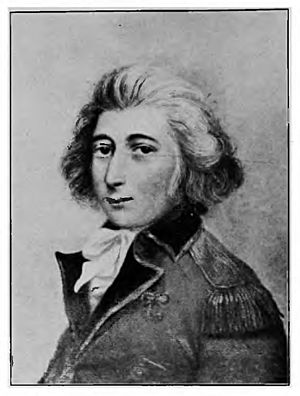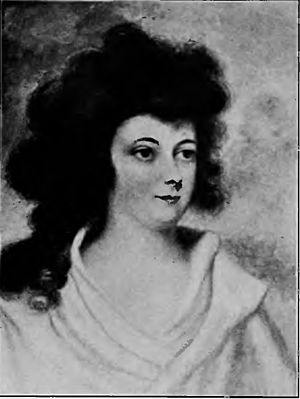Andrew Deveaux facts for kids
Quick facts for kids
Andrew Deveaux
|
|
|---|---|
 |
|
| Born | 30 April 1758 St Helena's Parish, South Carolina |
| Died | 11 July 1812 Red Hook, New York |
| Allegiance | United Kingdom of Great Britain and Ireland |
| Service/ |
Loyalist |
| Rank | Colonel |
| Commands held | South Carolina Loyalist Militia |
| Battles/wars | |
Andrew Deveaux (born April 30, 1758 – died July 11, 1812) was an American Loyalist from South Carolina. Loyalists were people in the American colonies who stayed loyal to the British during the American Revolutionary War. Deveaux is most famous for taking back the Bahamas for the British in 1783.
Contents
Early Life of Andrew Deveaux
Andrew Deveaux Jr. was born on April 30, 1758, in St Helena's Parish, Beaufort, South Carolina. His parents, Andrew Deveaux Senior and Catherine Barnwell, owned large farms called plantations. His family's history goes back to France in 1665.
Andrew Deveaux Jr. owned many thousands of acres of land. This land was located around Prince William Parish and Port Royal Island in South Carolina.
Service During the American Revolution
When he was 17, Andrew Deveaux Jr. first joined the Continental Army. This was the army fighting for American independence. However, his father was often bothered by people in Beaufort for supporting the British.
To defend his father, young Deveaux gathered a group of Loyalists. They caused trouble in and around Beaufort. They are believed to have burned a church in April 1779.
Deveaux later joined the British forces in 1779. He served under Major General Augustine Prévost. He was part of the Siege of Savannah, where American and French attacks were stopped. He also fought in the Siege of Charleston.
After the Siege of Charleston, Lord Cornwallis gave him a special job. Deveaux was asked to create a new group called the "Royal Foresters." He was promoted to colonel. He led a group of Loyalist fighters who captured two American generals in surprise attacks in the woods.
In 1782, Deveaux was part of the British soldiers in Charleston. In December of that year, the British left South Carolina. Deveaux and his men went to St. Augustine, Florida. This city was the capital of East Florida. There, he started planning to take back the Bahamas for the British Crown. The capital of the Bahamas, Nassau, had been captured by the Spanish earlier in 1782.
Recapturing the Bahamas in 1783
From St. Augustine, Deveaux began his mission. He started with 70 men and 6 ships. While on Harbour Island, Bahamas, another 170 men joined him. This meant he had only 220 men and 150 muskets. They were going to face a Spanish force of 600 soldiers.
Deveaux managed to make the Spanish commander, Don Antonio Claraco Sauz, surrender. This happened on April 17, 1783. Amazingly, not a single shot was fired during this event. When Deveaux took down the Spanish flag, it was a historic moment. It was the last time a foreign flag would fly over the capital of the Bahamas.
Later Life and Legacy
As a reward for taking back the Bahamas, Deveaux received a large piece of land. This land was on Cat Island. He built a large house, called a mansion, at Port Howe, Cat Island. You can still see the remains of this mansion today.
He traveled to England in September 1783. He often returned to the islands. However, he made most of his money in Red Hook, New York. He lived there for the rest of his life.
Andrew Deveaux married Anna Verplanck. They had four children: Steven, William, Augusta Maria, and Julia. Julia later married an American farmer named John Hare Powel. Deveaux and his family were important in developing new plantation islands.
Deveaux died in July 1812. He left a large amount of land in the Bahamas in his will.
 | Jewel Prestage |
 | Ella Baker |
 | Fannie Lou Hamer |


